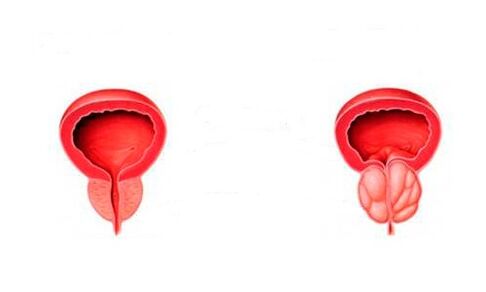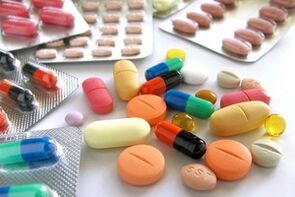Today, prostatitis medications are far from last in terms of the variety of drugs offered. And it is not in vain: prostate disease is the most common among pathologies of the male reproductive system.

Prostatitis is an inflammatory process of the prostate gland.
Most often, inflammation of this organ manifests itself:
- discomfort in the reproductive organs during or in addition to the act of urinating;
- pain during ejaculation (ejaculation);
- Discomfort in the pelvic area and external genitalia.
All of this leads to decreased activity and general happiness, emotional instability, and psychological disturbances. If you experience these symptoms, you should immediately contact a specialist.
A qualified urologist will perform the necessary diagnostic methods and help deal with the disease.
While it should be noted that the healing process can take some time, it is easier to deal with minor dysfunctions of this organ than to initiate an irreversible developmental process that leads todeadly consequences, including prostate cancer.
General provisions of therapy

As noted above, prostatitis is an inflammatory process, and like any inflammation, it's usually caused by bacteria, so it's not surprising that prostatitis medications are primarilyare antibacterial agents (antibiotics).
The next step in the fight against this disease is non-steroidal anti-inflammatory drugs. They have a positive effect by reducing edema in the area of the prostate gland by affecting the microcirculation in this organ. The goal of this treatment is to reduce the blockage of veins in the small pelvis.
Another important point in the management of patients with diseases of the reproductive system is the reduction of pain syndromes. In most cases (especially in the chronic or complex form of the disease), pain is the primary cause, so the physician should help the patient cope with extremely uncomfortable sensations in the genitals. out as soon as possible.
The final stage is to prevent the development of treatment complications and future relapses.

Here it is appropriate to prescribe drugs that regulate immunity, vitamin therapy, recommendations for improving general well-being, which may include:
- a low-fat diet;
- moderate physical activity;
- stay in the fresh air;
- compliance with the basic rules of personal hygiene;
- refuse bad habits (smoking, alcohol);
- Regular health check-up every six months.
By following these simple rules, you can not only avoid complications, but also prolong your sexual activity.
Step One: Pest Control
Experts conditionally divide antibacterial drugs for prostatitis into three main groups: fluoroquinolones, tetracyclines and macrolides, less often - cephalosporins.
Fluoroquinolones are considered the most effective in the treatment of diseases of this organ due to a number of their features:
- has an effect on most microorganisms that cause disorders of the genitourinary system;
- accumulation in the tissues of the gland gives the maximum effect on bacteria;
- practically does not cause immunodeficiency after a course of treatment;
- do not cause drug resistance (the resistance of microorganisms to the action of antibacterial drugs of this group).
Other prominent representatives of the group of antibacterial agents for inflammation of this organ are tetracyclines and macrolides.
Long before their improved companions, the fluoroquinolones, these drugs helped deal with bacterial-induced prostate dysfunction. However, over time, microorganisms become increasingly resistant to these two classes of drugs. In addition, these classes of drugs have a rather long list of side effects and contraindications.
It should be noted that any antibacterial drug can have a toxic effect on sperm, and patients should be warned in advance. Antibiotics should not be used for at least four months before conception (the entire spermatogenesis cycle).
Step two: reduce swelling
Prostate drugs, which have a positive effect on the microcirculation, have been proven effective in the modern prostate disease program. They contribute to the full supply of medicinal compounds to the tissues of the gland through the blood, improve the outflow of secretions from the ducts of this organ, increase cellular metabolism, in general help the bodycan fight inflammation.
Among this group of drugs, non-steroidal anti-inflammatory drugs (NSAIDs) are distinguished. Most often, two drug forms of this series are used:
- rectal suppositories - due to the local action of the drug, the effect manifests itself relatively faster, reducing the frequency and duration of hospitalization;
- drops are brought inside. The course of treatment lasts twice as long as when using rectal suppositories. Prescribe from 15 drops before meals 4 times a day.
To help patients
Drugs for the treatment of prostatitis, the main directions of action are immunomodulatory and analgesic, non-specific. But they can still ease the patient's fate and reduce the risk of re-inflammation.
To relieve pain, your doctor may prescribe pain medication orally (by mouth) or rectally (suppositories and micro-tablets). At the same time, oral tablets give relatively short-term effects, but are more convenient to use.
Specific therapy
Recently, more and more effective prostatitis drugs, which have limited effect in the body, are increasingly being prescribed. All of them are combined and act in the tissues of the gland, in parallel they have a beneficial effect on the cells of the organ, increasing metabolism and the process of restoring functions.
Combination drugs are convenient to use, but don't forget the generally accepted prostatitis regimen. It is best to consult a specialist about taking these medications.
Hormone therapy for prostatitis
More and more male sex hormones are being prescribed in general prostatitis treatment regimens. But it's important to remember that they must be looked after with the utmost care, and before your appointment, make sure they're essential to the patient.
Patients with this disease have noticed a decline in the quality of their sex lives for a long time. Among other things, such patients suffer from depression and lethargy under the background of their sexual inferiority. Hormone therapy will help to cope with sexual dysfunction and improve a person's general condition.
Whatever medicine a urologist recommends to restore health, don't forget that the key point in the treatment of any disease is strict adherence to your doctor's prescriptions and orders, early diagnosis and treatment. Your health care provider.
And regardless of the possibility of recurrence, don't neglect prevention. Prevention is better than cure.































